Features
The Executive Presidency as JRJ saw it

(Excerpted from Men and Memories by JR Jayewardene)
(The elected Executive Presidency was adopted in Sri Lanka in 1978. The original idea was mine and there is controversy about it in Sri Lanka now. I explained the Constitution in this lecture delivered in July 1991.)
The first suggestion to introduce the Executive Presidency system of Government in Sri Lanka was made by me while I was a Minister in the Dudley Senanayake Government of 1965-1970, in a speech to the Science Students Association of the Colombo University in December 1966. Some of the remarks I made then were as follows:
In some countries, the executive is chosen directly by the people and is not dependent on the legislature during the period of its existence, for a specified number of years. The new French Constitution is a combination of the British and the American systems. Such an executive is a strong executive, seated in power for a fixed number of years, not subject to the whims and fancies of an elected legislature; not afraid to take correct but unpopular decision because of censure from its parliamentary party. This seems to me a very necessary requirement in a developing country faced with grave problems such as we are faced with today.
The next occasion I raised this questions was when I was in the Opposition. Mrs. Bandaranaike’s government was considering amending the Constitution, to introduce the Republican Constitution of 1972. I suggested to the United National Party Working Committee that we put forward our views supporting the Executive Presidential system at the Constituent Assembly. The Party did not agree. But Dudley Senanayake who did not support it, stated that we must remember that the most powerful country in the world today, America, has attained that stature under an Executive Presidential system.
On July 2, 1971, at the Meeting of the Constituent Assembly, I was permitted to propose that we adopt the Executive Presidential system in place of the Westminster model. R. Premadasa, who was in the Opposition with me, seconded the proposal. We received no support and the motion was defeated.
One reason for adopting the Presidential system was the instability that was attached to a government under the Westminster type of Constitution. Let us look at our own country since we attained independence in 1948.
At the General Election of 1947, no party obtained an overall majority. The UNP under D.S. Senanayake had the largest number of members and was invited by the Governor to form a government which he did. He was able to carry on his work through a parliamentary majority which had the support of 21 Independent members, who called the tune. The Independents could defeat the government at any time by voting against its proposals. The support of the Independents was obtained largely through the influence and stature that D.S. Senanayake wielded as “Father of the Nation” and one chiefly responsible for obtaining freedom from the British.
On his (D.S. Senanayake’s) death in March 1952, Dudley Senanayake, the new Prime Minister, called for a General Election within a month and he was returned with a two-thirds majority. However, there was much trouble within the Government Parliamentary Party. A few Cabinet Ministers combined together to make it difficult for Dudley Senanayake to govern.
As a result of the resignation of Dudley Senanayake in 1953, Sir John Kotelawala became the Prime Minister. He too, facing trouble from within the party, called for elections in February 1956, fifteen months before the life of the Parliament was over.
S.W.R.D. Bandaranaike formed a government with the aid of other parties, after the 1956 elections. He found it difficult to maintain the government as several parties that had helped him to form a coalition government were pulling in various directions. Resort to a long prorogation did not help. His death in September 1959 deepened the crisis and Parliament was dissolved soon after his death by his successor W. Dahanayake, after a regime that lasted three and a half months.
As a result of this dissolution, a ‘Hung Parliament’ was elected in April 1960. Dudley Senanayake leading the UNP had the largest number of members in the House but did not have a majority in Parliament. Being defeated on the Throne Speech debate, he dissolved Parliament.
Mrs. Srimavo Bandaranaike’s Party had the largest number of members in the June 1960 elections and in December 1964, after a long prorogation which did not help, the government was defeated and she dissolved Parliament before her term was over in 1965.
The 1965 April elections put Dudley Senanayake in office with a majority in Parliament and he was able to govern the country,, for the full period from 1965 to 1970. It was the first occasion since independence in 1948 that a political party was able to govern the country for a full period of five years.
Mrs. Bandaranaike won the 1970 General Election, this too with the help of several other parties and she formed a coalition government. She extended her period of five years which ended in 1975 by another two years with the help of all the coalition members. As some of the coalition members left soon after, she also decided to go to the electorate and dissolved Parliament in 1977.
In the 1977 July elections, the UNP was returned with a five sixths majority and I became the Prime Minister. With the consent of the Cabinet and the Parliamentary Group, we introduced the Executive Presidential system of government in the Constitution Bill of 1978, a few months after the government was formed in July-August 1977. The Bill was passed in Parliament by a two thirds majority, after a Parliamentary Committee of all parties considered the Draft Constitution Bill at public sittings.
In the Westminster form of government which we had followed from 1947 to 1972 and as a Republic from 1972 to 1977, the executive power lies in the Parliament and is exercised through the Prime Minister and the Cabinet of Ministers. The Prime Minister is chosen only if he has a majority of members in the Legislature and can command their support. If he loses that support in the United Kingdom, the monarch can request him to resign and call upon another member to be the Prime Minister, or dissolve Parliament.
With slight amendments, this is the system adopted by most of the dependencies of the UK now free, and the self-governing dominions. We too had a similar Constitution though we became a Republic in 1972.
The Executive Presidency was followed in the USA and later in France, under President De Gaulle. The founders of the American Constitution, after they defeated the British, made the President elected by the whole country, the executive authority, and the Legislature consisting of the House of Representatives and the Senate, both elected, the Legislative Authority. The President could choose his Cabinet from any American citizen, except a member of the Legislature.
An Independent Judiciary; the power of the Legislature vis-a-vis the President, which enabled it to act as a check on Presidential power, and an Independent Press, were the checks and balances which made the Constitution work democratically.
The French Constitution of De Gaulle followed the same pattern with a few differences. For example, the President had to choose his Cabinet from elected members of the Legislature and once they were chosen they had to resign their seats.
The Constitution maintained continuity while effecting change. Some countries had written constitutions, some were governed by conventions and some had none. The USA, France, Sri Lanka, India and many countries had written constitutions. The UK was an example of a country having no written constitution but governed by consent, conventions and ad hoc laws. Some had no constitutions. It was better that they did not have because they were governed by Dictators and under Military Authority.
Sri Lanka was a monarchy under Asian dynasties, Sinhalese and Dravidian, till 1815; and Western till 1972. It was till then one of the oldest monarchies in the world, having an unbroken history since 600 BC, from King Vijaya to Queen Elizabeth II, when we became a Republic in 1972.
From 1815 till 1931, all executive authority was exercised by the Governor on behalf of the monarch. In 1931, the Donoughmore Constitution created the Executive Committee system and the Legislature performed two functions-legislative functions as a State Council as it was called, and executive functions by the State Council through Executive Committees to which its Members were elected by the Council. The Ministers were the elected Chairmen of these Committees. The State Council and all its members were elected by universal franchise. The Sri Lankans were the first people in Asia to enjoy this privilege.
In 1947, under the Soulbury Constitution, the Westminster Constitution was introduced, where following the British pattern the British Minister who led the majority in the Legislature was appointed as such by the Governor General.
In February 1948, Sri Lanka was given the status of a Dominion by an Independence Act introduced in the British House of Commons and she became a Free and Independent Member of the British Commonwealth of Nations. In 1972, after the Constituent Assembly had met and deliberated and accepted a new Constitution, Ceylon was made a Republic, but the Westminster model was retained.
In February 1978, a complete change took place with the executive power vested in a President elected by the whole country with a 50 per cent majority and legislative power being vested in the elected Legislature.
The 1978 Constitution had been tailor-made for a democracy. Let us examine its provisions under the heading made famous by the American President Abraham Lincoln’s speech in 1863, opening the memorial to the dead, commemorating the decisive victory of the Federal forces at Gettysburg. He defined Democracy as “a government of the People; by the People; for the People”.
Chapter 1, Sec. 3, proclaims the sovereignty of the People and Sec. 4 states how it is exercised; (a) the legislative power by Parliament consisting of elected representatives of the People and by the People at a Referendum; (b) the executive power by the President of the Republic elected by the People; (c) the judicial power by Parliament through Courts, etc. created and established or recognized by the Constitution or created and established by law. This Section also refers to fundamental rights and the franchise.
The Cabinet of Ministers shall consist of the President as the Head, and the Prime Minister and Ministers from among the Members of Parliament, (Chapter VIII, 5.43 and 5.44.) The Sections dealing with the sovereignty of the people and certain Fundamental Rights cannot be amended without a two-thirds majority in Parliament and approved by the people at a Referendum.
Similar approval is necessary for legislation to extend the term of office of the President or the duration of Parliament for over six years. This is a unique feature for even if the whole Parliament votes in favour of such an extension, unless approved by the people at a Referendum, it does not become law.
I think no democratic nation in the world has this unique power given to the people by its legislature. It was with this power that the people extended the period in office of the Parliament elected in 1977 by six years. All previous extensions for example in 1975, were by parliamentary approval only, or by an Order-in-Council before freedom.
The government is clearly based on an elected President, with executive powers, responsible to Parliament as Head of an elected Cabinet, chosen from Parliament; charged with the direction and control of the government; and collectively responsible and answerable to Parliament (Chapter VIll).
Many interesting questions for discussion can arise on an interpretation of the sections dealing with the Cabinet of Ministers and their executive powers. Do they derive them as agents of the Executive President or with power vested in them when they are charged under S.43(1) with the direction and control of the government? I leave this question for constitutional experts to decide.
To complete the part dealing with sovereignty of the People, the Independence of the Judiciary is vital. While the Judiciary is clearly stated as exercising the judicial power of the people, they do so through courts, tribunals and institutions that are created by Parliament. Their independence is secured in various ways spelled out from Sections 107 to 117.
Appointments to the Supreme Court and the Court of Appeal are by the President by warrant under his hand. They shall not be removed unless the majority in Parliament so address the President to remove them. Their salaries, once determined by Parliament, shall not be reduced after appointment. Judges of the High Court are also appointed by the President and are subject to disciplinary control of the President on the recommendation of the Judicial Service Commission.
All other judges are appointed by the Judicial Service Commission which consists of the Chief Justice and two other judges of the Supreme Court. Disciplinary action is also taken by them.
Under the previous Constitution of 1972, all the minor Judiciary appointments were made by the Cabinet of Ministers. This Constitution attempts as far as humanly possible to create conditions for the Judiciary to be independent; the rest is in the hands of the Judges themselves, “who must be men of courage, men of wisdom”.
There are other sections of the Constitution which deal with Buddhism (Chap. II), Language (Chap.IV), and Citizenship (Chap.V); also with Superior Courts (Chap.XVI), Parliamentary Commissioner (Chap. XIX), Emergency Laws S.15 & 16 and (Chap. XVIII).
A government of the people and by the people, is adequately provided for and protected. Only through approval by the people at a Referendum can these provisions be amended or taken away democratically.
It should be mentioned, however, that fundamental rights may be temporarily restricted in the interests of national security, racial and religious harmony, national economy and a few other reasons mentioned in Chapter III, Section 15.
The power to make regulations under the Public Security Ordinance which can overrule, amend or suspend the operation of the provisions of any law except the provisions of the Constitution, is dealt with in Chapter (XVIII). Within 14 days of the Proclamation of an Emergency, Parliament must be informed and approve it, see (Chapter XVIII, Section 155(6).
No earlier Constitution required the approval of Parliament for the Declaration of an Emergency or the operation of Emergency Laws.
The emergence of a multi-party system so essential for a democracy is made possible by the inclusion among the “Fundamental Rights” to every citizen of Freedom of Speech, Publication, Assembly, Trade Union rights, etc. In section 14(1). The part dealing with “for the people” is also not forgotten.
In Chapter VI-S.27 to 29, these are enumerated. I need cite’ only one Section S. 27(2). If it is possible to fully implement these economic and social policies, it must bring peace and prosperity, but terrorism and other forms of violence are a hindrance. Also it must be remembered that from June 1960 to 1964 and 1970 to 1977, we had governments following Communist principles which even the Soviet Union has now abandoned. Recovery from these policies had begun from 1977-1983 with the Free Market Policy and other policies laid-down in the Constitution when terrorism reared its head and hit us like a tornado from 1983 onward.
Features
Ukraine crisis continuing to highlight worsening ‘Global Disorder’
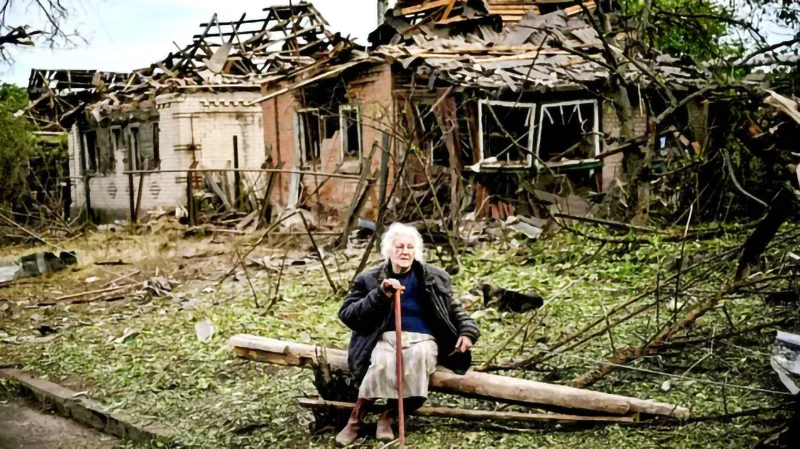
 The world has unhappily arrived at the 4th anniversary of the Russian invasion of Ukraine and as could be seen a resolution to the long-bleeding war is nowhere in sight. In fact the crisis has taken a turn for the worse with the Russian political leadership refusing to see the uselessness of its suicidal invasion and the principal power groupings of the West even more tenaciously standing opposed to the invasion.
The world has unhappily arrived at the 4th anniversary of the Russian invasion of Ukraine and as could be seen a resolution to the long-bleeding war is nowhere in sight. In fact the crisis has taken a turn for the worse with the Russian political leadership refusing to see the uselessness of its suicidal invasion and the principal power groupings of the West even more tenaciously standing opposed to the invasion.
One fatal consequence of the foregoing trends is relentlessly increasing ‘Global Disorder’ and the heightening possibility of a regional war of the kind that broke out in Europe in the late thirties at the height of Nazi dictator Adolph Hitler’s reckless territorial expansions. Needless to say, that regional war led to the Second World War. As a result, sections of world opinion could not be faulted for believing that another World War is very much at hand unless peace making comes to the fore.
Interestingly, the outbreak of the Second World War coincided with the collapsing of the League of Nations, which was seen as ineffective in the task of fostering and maintaining world law and order and peace. Needless to say, the ‘League’ was supplanted by the UN and the question on the lips of the informed is whether the fate of the ‘League’ would also befall the UN in view of its perceived inability to command any authority worldwide, particularly in the wake of the Ukraine blood-letting.
The latter poser ought to remind the world that its future is gravely at risk, provided there is a consensus among the powers that matter to end the Ukraine crisis by peaceful means. The question also ought to remind the world of the urgency of restoring to the UN system its authority and effectiveness. The spectre of another World War could not be completely warded off unless this challenge is faced and resolved by the world community consensually and peacefully.
It defies comprehension as to why the Russian political leadership insists on prolonging the invasion, particularly considering the prohibitive human costs it is incurring for Russia. There is no sign of Ukraine caving-in to Russian pressure on the battle field and allowing Russia to have its own way and one wonders whether Ukraine is going the way of Afghanistan for Russia. If so the invasion is an abject failure.
The Russian political leadership would do well to go for a negotiated settlement and thereby ensure peace for the Russian people, Ukraine and the rest of Europe. By drawing on the services of the UN for this purpose, Russian political leaders would be restoring to the UN its dignity and rightful position in the affairs of the world.
Russia, meanwhile, would also do well not to depend too much on the Trump administration to find a negotiated end to the crisis. This is in view of the proved unreliability of the Trump government and the noted tendency of President Trump to change his mind on questions of the first importance far too frequently. Against this backdrop the UN would prove the more reliable partner to work with.
While there is no sign of Russia backing down, there are clearly no indications that going forward Russia’s invasion would render its final aims easily attainable either. Both NATO and the EU, for example, are making it amply clear that they would be staunchly standing by Ukraine. That is, Ukraine would be consistently armed and provided for in every relevant respect by these Western formations. Given these organizations’ continuing power it is difficult to see Ukraine being abandoned in the foreseeable future.
Accordingly, the Ukraine war would continue to painfully grind on piling misery on the Ukraine and Russian people. There is clearly nothing in this war worth speaking of for the two peoples concerned and it will be an action of the profoundest humanity for the Russian political leadership to engage in peace talks with its adversaries.
It will be in order for all countries to back a peaceful solution to the Ukraine nightmare considering that a continued commitment to the UN Charter would be in their best interests. On the question of sovereignty alone Ukraine’s rights have been grossly violated by Russia and it is obligatory on the part of every state that cherishes its sovereignty to back Ukraine to the hilt.
Barring a few, most states of the West could be expected to be supportive of Ukraine but the global South presents some complexities which get in the way of it standing by the side of Ukraine without reservations. One factor is economic dependence on Russia and in these instances countries’ national interests could outweigh other considerations on the issue of deciding between Ukraine and Russia. Needless to say, there is no easy way out of such dilemmas.
However, democracies of the South would have no choice but to place principle above self interest and throw in their lot with Ukraine if they are not to escape the charge of duplicity, double talk and double think. The rest of the South, and we have numerous political identities among them, would do well to come together, consult closely and consider as to how they could collectively work towards a peaceful and fair solution in Ukraine.
More broadly, crises such as that in Ukraine, need to be seen by the international community as a challenge to its humanity, since the essential identity of the human being as a peacemaker is being put to the test in these prolonged and dehumanizing wars. Accordingly, what is at stake basically is humankind’s fundamental identity or the continuation of civilization. Put simply, the choice is between humanity and barbarity.
The ‘Swing States’ of the South, such as India, Indonesia, South Africa and to a lesser extent Brazil, are obliged to put their ‘ best foot forward’ in these undertakings of a potentially historic nature. While the humanistic character of their mission needs to be highlighted most, the economic and material costs of these wasting wars, which are felt far and wide, need to be constantly focused on as well.
It is a time to protect humanity and the essential principles of democracy. It is when confronted by the magnitude and scale of these tasks that the vital importance of the UN could come to be appreciated by human kind. This is primarily on account of the multi-dimensional operations of the UN. The latter would prove an ideal companion of the South if and when it plays the role of a true peace maker.
Features
JVP: From “Hammer and Sickle” to Social Democracy – Or not?
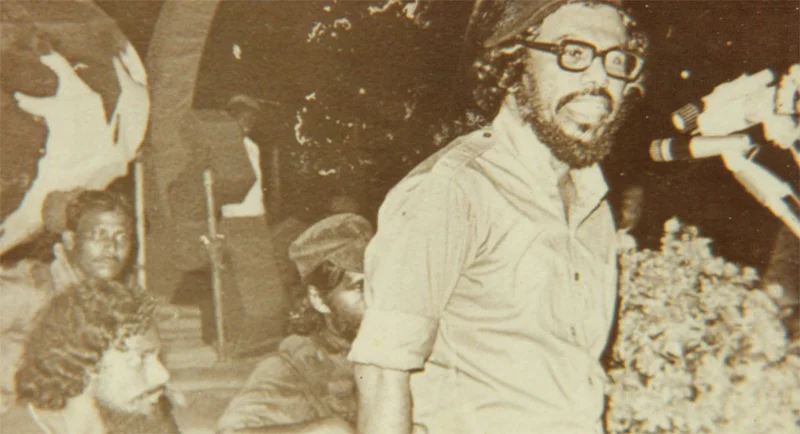
The National People’s Power (NPP), led by the Janatha Vimukthi Peramuna (JVP), came to power promising democratic renewal and long-awaited economic, educational, healthcare, and social transformation. It pledged to build a modern Sri Lanka rooted in democratic values while steering the country toward its vision of Democratic Socialism. For many supporters, the NPP’s rise to the pinnacle of political power represents a historic opportunity to reset the nation’s direction.
Yet recent developments have stirred unease. Statements by several senior ministers and certain policy signals have prompted critics to question whether the government’s path remains firmly democratic. Some warn that in the pursuit of rapid development and social justice, central pillars of the NPP’s election campaign, there may be a growing temptation to consolidate power in ways that edge toward policies of old “Hammer & Sickle.”
Is the NPP committed to pluralistic democratic socialism, or is Sri Lanka witnessing the early signs of a more centralised political model? To answer this question, it is necessary to revisit the JVP’s ideological history, examine the pressures that shape governing parties once in power, and weigh the potential consequences, both promising and perilous, of any shift in direction.
History of the JVP
The JVP emerged in the mid-1960s with a revolutionary agenda, mobilising youth through its Five Lecture Programme, which criticised capitalist policies, questioned the country’s “real independence,” opposed Indian influence, and called for armed struggle. This ideology culminated in the 1971-armed uprising against the elected government, leading to widespread violence, a harsh state crackdown, mass arrests, and the banning of the party.
Although suppressed, the JVP later re-entered democratic politics after its leaders were imprisoned and eventually pardoned. In the 1980s, after electoral defeat, the JVP shifted from strict Marxist-Leninist ideology toward a national, framework known as “Jathika Chinthanaya”, while maintaining strong opposition to Indian involvement.
However, it launched a second violent insurgency in 1988–1989, resulting in significant loss of life and severe repression, including the killing of its leader, Rohana Wijeweera. These events marked a decisive turning point, after which the party gradually moved away from armed struggle and embraced parliamentary politics.
By 1994, the JVP abandoned armed insurrection and embraced parliamentary democracy. While retaining its Marxist-Leninist identity, it adopted a more pragmatic socialist approach, seeking influence through elections rather than violence.
Embracing Parliamentary Democracy
The party served as Ministers and Deputy Ministers under President Chandrika Kumaratunga (2004–2005) and later supported Mahinda Rajapaksa in the 2005 presidential and subsequent parliamentary elections. Between 2005 and 2010, the JVP aligned with the Rajapaksa government in opposing federalism and supporting a unitary state.
Historically, the JVP opposed federalism. Under Anura Kumara Dissanayake (AKD), however, there appears to be a strategic shift toward decentralisation and inclusivity, without formally endorsing federalism. Since 2019, the NPP/JVP has criticised successive governments for failing to implement the 13th Amendment fully. This transformation is real and should be acknowledged.
Reports indicate the NPP/JVP is drafting a new constitution, but there is limited public clarity on its position regarding abolishing the Executive Presidency and devolving powers to Provincial Councils. Sri Lanka can chart a path toward a united, prosperous future where all citizens feel valued and represented. Therefore, I hope that NPP will consider the Provincial Councils in their current form might best serve as a relic of the past, making way for more cohesive and efficient systems of governance.
It is also a fact that many parties have historically criticised the Executive Presidency while in opposition, only to retain it in power. Whether the NPP/JVP will pursue genuine reform remains a subject of debate.
Democratic Concerns State Power
A recent statement by a senior Cabinet Minister that the party holds government power but has not yet “captured” broader state power raises fundamental questions. In a parliamentary democracy, winning government is the highest legitimate authority a party can obtain. Government power is temporary which is granted by voters, limited by the Constitution, and revocable at elections.
State power is permanent and it lies with state institutions i. e. the judiciary, administrative service, armed forces, law enforcement, and independent commissions. These bodies must remain politically neutral and serve the Constitution, to prevent any ruling party from dominating the permanent machinery of governance.
To frame democratic victory as incomplete without “capturing” state power, suggests a conception of power that goes beyond electoral legitimacy. It echoes a revolutionary mindset highlighting the real transformation requires ideological alignment of the state itself.
Past few decades, Sri Lanka has suffered from politicised institutions. Replacing one form of control with another is not reform, it is substitution.
Judiciary and Due Process
Public frustration over past corruption is understandable. However, allegations must be addressed through due legal process. In a democracy, individuals are innocent until proven guilty in a court of law. When parliamentarians publicly pass judgments on opposition figures before judicial proceedings conclude, it risks undermining the rule of law and raising concerns about political overreach.
Concerns are further heightened when there are perceptions that the rule of law is not applied equally, particularly if members of the governing party are treated differently in similar circumstances in the recent past. Unequal enforcement of legal standards can erode public trust in institutions. If such patterns persist, they may raise broader questions about the strength and impartiality of democratic governance.
Village-Level Courts
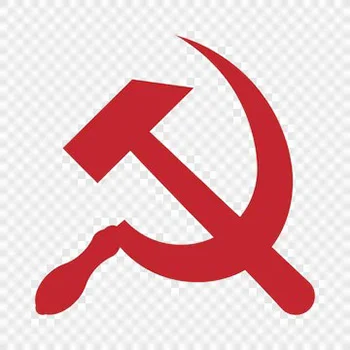
Democratic Concerns
State Power
In another recent statement, by a senior Minister reiterated one of his earlier proposals to establish judicial courts at the village level to adjudicate certain legal cases, depending on the nature and severity of the alleged offences. While improving local access to justice may enhance efficiency, such courts require strong institutional safeguards.
As this proposal raises serious concerns, it bears characteristics often associated with totalitarian systems, where village-level courts may be controlled by ruling party “cadres” who preside over legal matters and pass judgments against individuals. Without strong safeguards to ensure independence, transparency, and adherence to the rule of law, such courts could be misused to suppress dissent and curtail legitimate political opposition.
Any reform of the judicial system must uphold constitutional protections and preserve the separation of powers. Failing to do so could raise broader concerns about democratic accountability and institutional independence.
Civil / Administrative Service
Before 1978, Sri Lanka’s civil service was widely respected for its professionalism and independence. Over time, however, political appointments increasingly influenced senior administrative positions.
There are growing concerns that some recent appointments to high-level administrative service posts by the NPP may also be politically motivated. Many voters expected systemic reform and a decisive shift toward merit-based governance under the NPP/JVP. It is disappointing to observe indications that similar patterns of politicisation may be continuing.
The real test of reform lies not in rhetoric but in institutional safeguards. Transparent selection criteria, independent oversight mechanisms, and clear accountability structures are essential to ensuring that the administrative service remains professional and non-partisan.
History shows that democracy does not usually collapse overnight. It erodes gradually when ruling parties seek to align permanent institutions with their own ideological or political objectives.
Strengthening institutional independence is not optional, it is imperative. Sri Lanka’s democratic future depends not only on who holds power, but on how responsibly that power is exercised.
Media Freedom
“I disapprove of what you say, but I will defend to the death your right to say it”
(Evelyn Beatrice Hall, describing Voltaire’s belief in freedom of speech.)
Recent reports suggest the NPP/JVP government is dissatisfied with parts of the media, accusing some outlets of political bias and even proposing bans for allegedly spreading false information. Such actions would be undemocratic and would weaken constructive criticism.
Governments already possess legal remedies for defamation. If laws are inadequate, they may be reviewed. However, this must not undermine the media’s fundamental right to fair, independent, and legitimate criticism of those in power.
Every government dislikes criticism. But mature democracies tolerate it. Any attempt to restrict the media risks eroding democratic freedoms and should be adamantly opposed by all who value an independent media.
Religion and Public Conduct
In the past, opposition parties accused the JVP of being hostile to religion, particularly toward Buddhist monks aligned with political opponents. Confirming this accusation, recently a few NPP/JVP ministers, MPs, and party supporters have publicly criticised Buddhist monks who speak and organise meetings against the government.
At the same time, social media contains intolerable language about the conduct of certain Buddhist monks. While misconduct by members of the clergy is concerning, it does not justify hostile or disrespectful reactions from politicians or the public.
Responding with anger and division contradicts the very Dhamma many claim to defend. Using monks as political tools, or attacking them publicly, only deepens social divisions. If there are genuine concerns about the monastic order, they should be addressed respectfully through proper religious channels rather than through public humiliation.
Economic Democracy
Following Sri Lanka’s 2022 fiscal crisis, the NPP/JVP revised its economic policy and aligned itself with a framework closer to Social Democracy. This shift suggests that the JVP has accepted capitalism as the economic system necessary to revive the collapsed economy. At the same time, it has emphasised redistribution, welfare measures, and regulatory reforms aimed at reducing inequality.
The NPP/JVP’s economic policy now focuses on reforming capitalism rather than replacing it. The party initially sought to renegotiate the IMF agreement to ease the burden on the public. However, it was unable to secure significant changes. A key long-term objective remains reducing dependency on imports. The NPP aims to promote local industries and agriculture, while supporting small and medium-sized enterprises (SMEs) to reduce unemployment and expand export capacity.
Although the party pledged to strengthen state-owned enterprises through improved management rather than outright privatisation, recent developments indicate a shift toward public-private partnerships and selective privatisation.
Overall, economic progress is gradually aligning with these reformed Capitalist policies. This approach marks a significant departure from the original “Hammer and Sickle” ideology associated with classical Marxist theory as articulated by thinkers such as Karl Marx, Vladimir Lenin, and Friedrich Engels.
If judged solely on economic direction, the shift from revolutionary rhetoric to reformist governance appears substantial.
Bribery and Corruption
The nation is deeply grateful to the NPP government for taking bold steps to minimise bribery and corruption, which have long been a cancer eating away at our society. For decades, this practice has existed from top politicians to the lowest levels of the state sector, and even within society at large. Full credit must be given to the NPP government for prioritising the fight against this unethical and deeply rooted problem. It is hoped that the law will be applied equally to everyone, irrespective of status or party affiliation.
However, the public remains sceptical about the delay in pressing charges against the alleged culprits. During the election campaign, the JVP claimed that it possessed substantial evidence, over one hundred files, sufficient to prosecute members of previous governments accused of misusing public funds. Are they now discovering that the evidence is not as concrete as initially suggested?
Conclusion
Having analysed the current situation of the NPP/JVP, it is evident that there are conflicting statements from some senior figures in the JVP. Some favour the continuation of the traditional “Hammer and Sickle” policies. Others within the NPP emphasise and implement aspects of Social Democratic policies. Considering these differences, the nation is entitled to seek clarity regarding the government’s present direction.
It remains to be seen whether the JVP is merely marking time before reintroducing its former ideological policies, or whether it has genuinely chosen the path of Social Democracy.
By Gamini Jayaweera
Features
Valentine’s Day fundraiser … a huge success
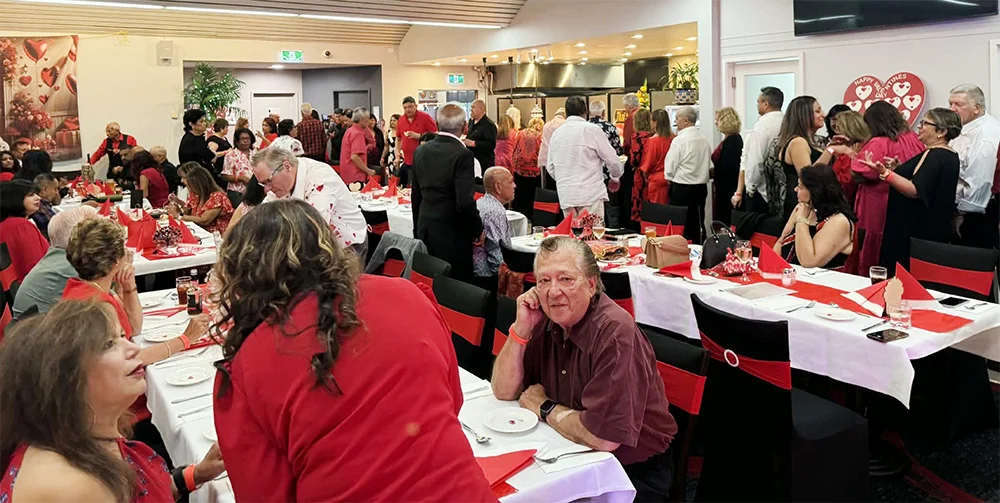
In Melbourne, Australia, catering veteran Chris Cannon hosted the annual Valentine’s Day fundraiser at the Springvale RSL, with all proceeds being donated to the Home of Compassion in Sri Lanka, run by the Mother Teresa Sisters.
The Valentine’s Day fundraiser was held on 14 February and the event featured music by Shey and George (of Redemption fame) and DJ Jeremy Ekanayake.
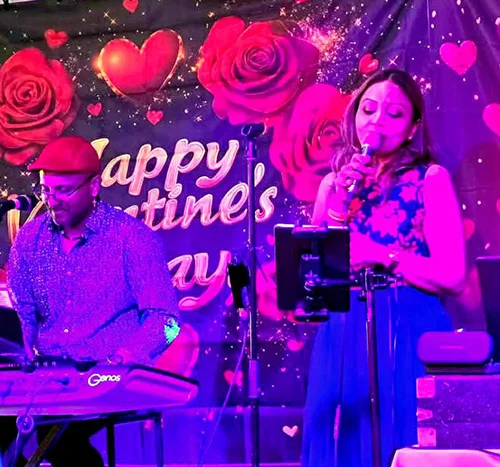
Shey and George providing the entertainment
The international buffet was a spread of Thai specialties and yummy Sri Lankan dishes and the large crowd present enjoyed the setup thoroughly, I’m told.
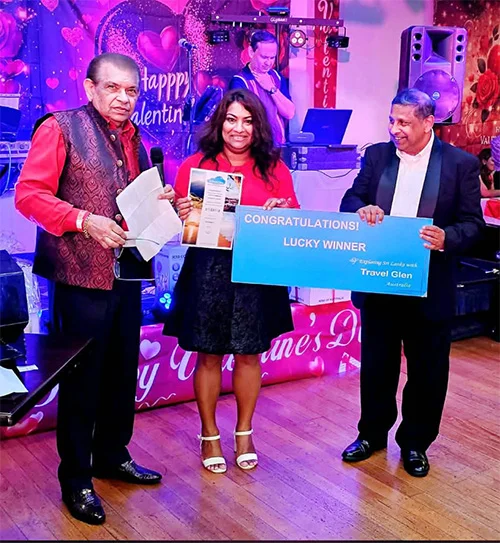
The lucky winner … trip to Sri Lanka
The Thai Street Food buffet was provided by Chris Cannon’s catering service, with his Thai wife, Annie, doing the needful.
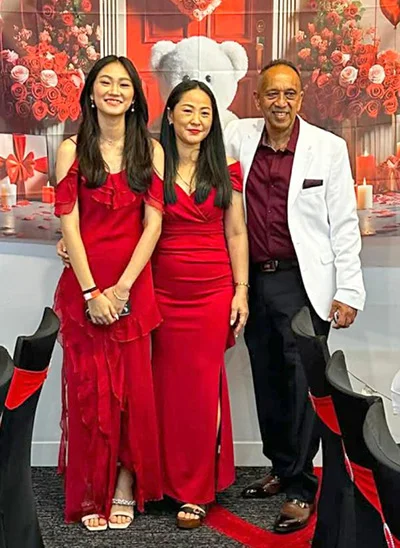
The Cannon Team: Alice, Annie and Chris
His daughter, Alice, also played an active part in this fundraiser.
Chris, a Sri Lankan-born Melbourne resident, who has been hosting this annual event for several years, with all proceeds going to charity, attributes the success of this Valentine’s Day fundraiser to the team that worked tirelessly to make it a happening event.

Rose and a teddy for the ladies
“I’m ever so grateful to the Team that was responsible for the success of this fundraiser. They all worked with enthusiasm and the smiles on their faces, at the end of the event, said it all.”
It was a sell-out, with every lady receiving a rose and a teddy but, unfortunately, said Chris “we had to disappoint several who wanted tickets as it was a limited space venue.”
What’s more, there were also attractive prizes on offer, including a seven nights stay in Sri Lanka.
-

 Features4 days ago
Features4 days agoWhy does the state threaten Its people with yet another anti-terror law?
-

 Features4 days ago
Features4 days agoReconciliation, Mood of the Nation and the NPP Government
-

 Features4 days ago
Features4 days agoVictor Melder turns 90: Railwayman and bibliophile extraordinary
-

 Features3 days ago
Features3 days agoLOVEABLE BUT LETHAL: When four-legged stars remind us of a silent killer
-

 Features4 days ago
Features4 days agoVictor, the Friend of the Foreign Press
-

 Latest News6 days ago
Latest News6 days agoNew Zealand meet familiar opponents Pakistan at spin-friendly Premadasa
-

 Latest News6 days ago
Latest News6 days agoTariffs ruling is major blow to Trump’s second-term agenda
-

 Latest News6 days ago
Latest News6 days agoECB push back at Pakistan ‘shadow-ban’ reports ahead of Hundred auction













